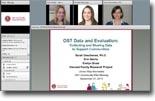The Harvard Family Research Project separated from the Harvard Graduate School of Education to become the Global Family Research Project as of January 1, 2017. It is no longer affiliated with Harvard University.

|
October 24, 2011 Webinar Archive—OST Data and Evaluation: Collecting and Sharing Data to Support CommunitiesSarah Deschenes, Erin Harris, Evelyn Brosi
|
Related Resources
Harvard Family Research Project’s (HFRP) out-of-school time (OST) and family engagement teams joined together to present this webinar to the United Way Worldwide’s Out-of-School Time Community Pilot Meeting on September 21, 2011.
The presentation examines the “essential data” that OST providers and intermediaries should consider collecting for an evaluation, and the important role families can play throughout the process.
While the webinar was developed specifically for the United Way, its lessons are applicable to all out-of-school time programs.
Watch this webinar to learn about:
- How OST fits into the broader context of expanded learning opportunities and year-round learning. Increasingly, those involved in youth’s learning are adopting a vision of learning that includes giving youth a seamless set of learning supports across settings throughout the day and year. We explore the role of OST within these expanded learning opportunities and year-round learning models.
- Our new tool designed to guide OST program leaders through key steps in the evaluation process. Get a sneak preview of our new tool, scheduled to launch as a pilot program in Fall 2011. This tool includes a series of nine steps to help plan and conduct an evaluation.
- How to select and collect the best data for your evaluation, with examples of data that can help you measure outcomes and impact. We outline key considerations for determining what data will be useful for programs to collect as well as tips on how to collect these data. We also highlight the types of data OST initiatives tend to collect in order to measure relevant outcomes at the program level, in addition to data that can support an evaluation across a network or system of OST programs.
- Collecting and sharing data across the community and with families. Better communication and data sharing across all the environments that support youth’s learning can result in better support for youth, improved student achievement, and enhanced program or partnership accountability. In this webinar, we discuss the unique role of families, the kinds of data that families can provide to strengthen programs, and strategies for sharing data with families in ways that enhance their ability to support their children’s success.
